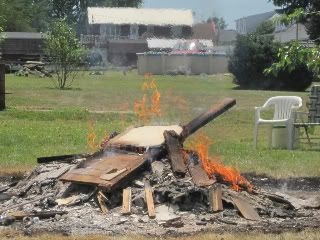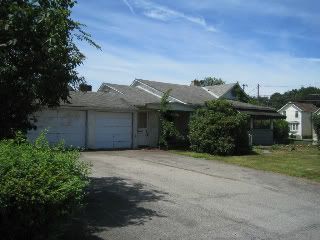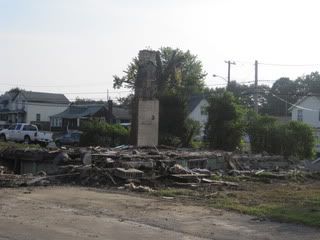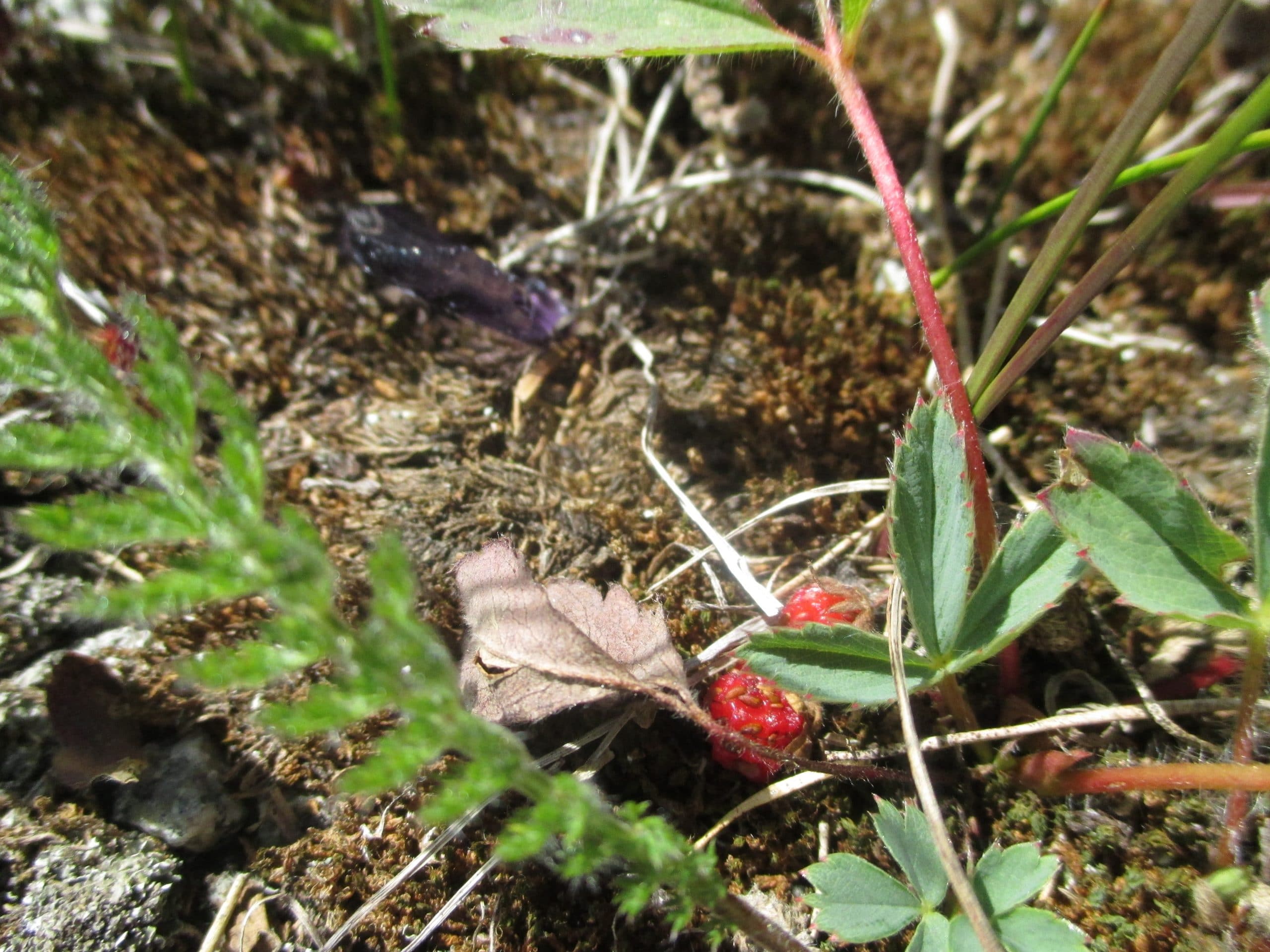 Every time we visit Pennsylvania, we notice the air pollution. According to a recent study by the Natural Resources Defense Council and Physicians for Social Responsibility, Pennsylvania’s air is the second most toxic in the nation. Much of the pollution comes from coal and oil-fired power plants in Pennsylvania and nearby states, but there are other sources as well. The coal trucks that rumble noisily through towns as they make their way from strip mines to power plants spew noxious smoke. The fly ash (the residue from the coal burned at the power plants) often hauled by these same trucks may also pollute the air. Now the widespread Marcellus shale natural gas drilling generates one more source of air contamination, both from truck traffic and the compressor stations that move the gas. And, there is still plenty of damage done by other industries. Drive along any of Pittsburgh’s famous three rivers, and you will see plants spewing smoke from their stacks.
Every time we visit Pennsylvania, we notice the air pollution. According to a recent study by the Natural Resources Defense Council and Physicians for Social Responsibility, Pennsylvania’s air is the second most toxic in the nation. Much of the pollution comes from coal and oil-fired power plants in Pennsylvania and nearby states, but there are other sources as well. The coal trucks that rumble noisily through towns as they make their way from strip mines to power plants spew noxious smoke. The fly ash (the residue from the coal burned at the power plants) often hauled by these same trucks may also pollute the air. Now the widespread Marcellus shale natural gas drilling generates one more source of air contamination, both from truck traffic and the compressor stations that move the gas. And, there is still plenty of damage done by other industries. Drive along any of Pittsburgh’s famous three rivers, and you will see plants spewing smoke from their stacks.
One often overlooked but important source of air pollution is household burning, the (unfortunately all too common) practice, mainly in rural and suburban areas, of incinerating trash. People in the neighborhood where I grew up have been burning for decades, day and night, 365 days a year. It is nearly impossible to leave a bedroom window open and not be assaulted with the noxious smell of smoke. On still days, smoke hangs in the air for hours, making it impossible to sit outside or conduct normal outdoor activities. Egg cartons, newspapers, plastic bags, cardboard boxes, yard refuse. We always hope we aren’t inhaling poisons.
Here is what the Canadian government agency, Environment Canada, says about household burning:
Open burning of garbage poses health risks to those exposed directly to the smoke. It especially affects people with sensitive respiratory systems, as well as children and the elderly. In the short term, exposure to smoke can cause headaches, nausea, and rashes. Over time, it can increase the risk of developing heart disease. Some of the pollutants contained in the smoke from open burning of garbage can include: Dioxins, Furans, Arsenic, Mercury, PCBs, Lead, Carbon monoxide, Nitrogen oxides, Sulphur oxides, Hydrochloric acid. Some of these pollutants can also end up in the ash that is left behind from open burning of garbage.
We have complained about burning for years, but people react as though we are chronic whiners. In response to our campaign against wood burning restaurants in Boulder, Colorado—in a situation where the smoke was infiltrating our apartment and making us sick—my cousin and my niece mocked our efforts on facebook. They didn’t seem to understand that air pollution is deadly. The irony is that they both live in Ohio, the state with the most toxic air in the United States.
 During the past two weeks, we witnessed the most insane household burning we have ever encountered. A man living about a block away from my mother’s house began to burn several times a day. His fires raged, with flames shooting high and dark smoke billowing upward and clouding the sky. At first, he was burning tree and bush limbs, but soon he was adding large planks of wood to the blaze. One night, we saw an enormous bonfire arising from his ash pit, at least ten feet high. People were sitting in chairs around the fire, as if at a high school football rally. Two neighbors complained, one saying that she had a black eye from rubbing it because of smoke irritation and another angry that he could not use his swimming pool. My mother developed a serious rash, and her doctor said it could have been from the burning. However, no one called the municipal authorities.
During the past two weeks, we witnessed the most insane household burning we have ever encountered. A man living about a block away from my mother’s house began to burn several times a day. His fires raged, with flames shooting high and dark smoke billowing upward and clouding the sky. At first, he was burning tree and bush limbs, but soon he was adding large planks of wood to the blaze. One night, we saw an enormous bonfire arising from his ash pit, at least ten feet high. People were sitting in chairs around the fire, as if at a high school football rally. Two neighbors complained, one saying that she had a black eye from rubbing it because of smoke irritation and another angry that he could not use his swimming pool. My mother developed a serious rash, and her doctor said it could have been from the burning. However, no one called the municipal authorities.
We hoped that the fires would stop after a few days, but they continued. We walked over to see what was going on, and we saw piles of wood and materials in the driveway and yard that seemed to indicate that the owners were remodeling the interior and burning everything they removed as they prepared it. Then the next day, we saw an old wooden piano and door frames in front of the house, and we suspected that the owner’s plan was to burn everything that would catch fire. He verified this to someone I know, stating that he was going to burn everything made of wood. In other words, he was going to burn the entire house, bit by bit, in his fire pit. When told him that he needed to get a dumpster and make arrangements to have the torn-down house hauled away, he gave my acquaintance the finger.
We knew that we were in for many bonfires and their accompanying poisons. Finally, however, a municipal official drove by the house and saw the fire and smoke. The owner tried to bamboozle her into believing that he was only burning wood, but she could see that he was violating the minimal burning regulations in place. The next day, a police officer came to the house and issued a citation. Miraculously, the burning stopped, a dumpster appeared, and we watched as at least a dozen large dump truck loads of wood were hauled away.
The world is in the midst of environmental catastrophe, and matters will continue to get worse. Yet, in the United States, a leader in generating pollution of all kinds, the mantras of economic growth and individualism reign supreme. Coal mining is good, no matter the damage every aspect of it does to the environment. We need the jobs, and it isn’t important what harm these jobs do. And we must have Marcellus shale drilling–for jobs, tax revenues, economic growth—the social costs be damned. What is more, millions of greedy property owners dream of big money from selling their property rights to the gas companies, just as they sold these rights to the coal companies. Even a small amount of money will secure a sale. A relative of mine told me that she was selling her rights to a gas company hustler for a pathetic $600. It apparently didn’t concern her that her neighbors might suffer as a consequence of her decision, much less the larger society. By the same logic, our maniac burner didn’t care that he was filling the air with toxins day and night. He was, in good American fashion, just trying to save a buck. What could be wrong with that?







